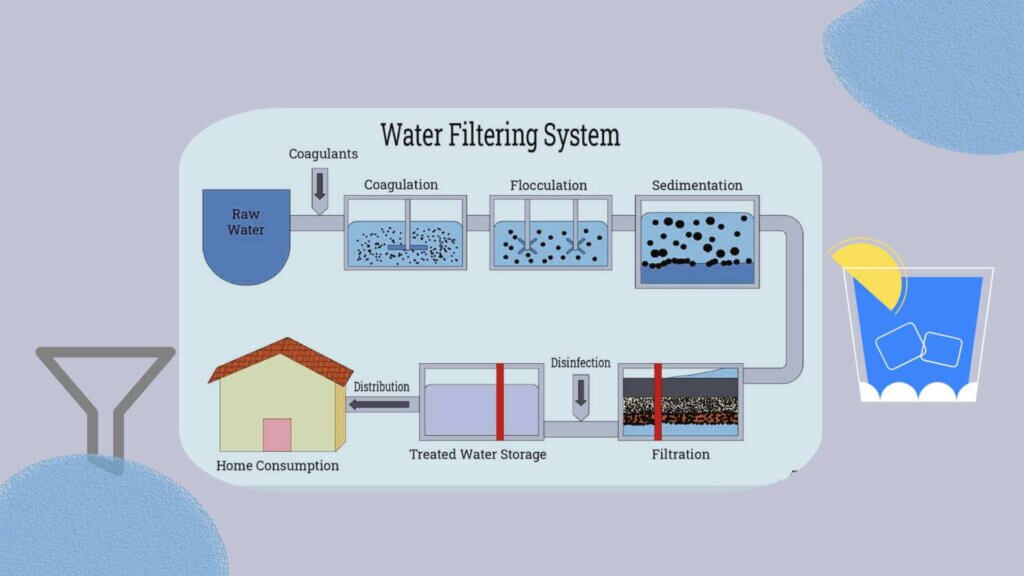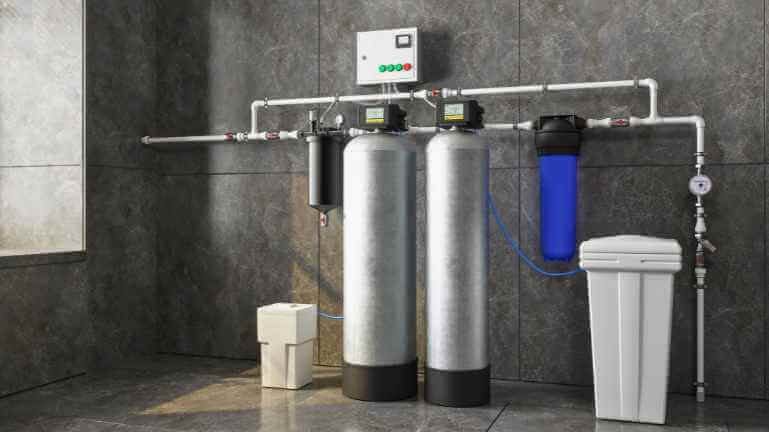Clean water is essential for health. Whole-house water filtration systems offer filtered water at every tap, removing contaminants and providing convenience. Understand system types, installation, maintenance, and costs for optimal health and savings.
Key Takeaways:
- Whole-house water filtration systems: Are essential for getting clean, safe water from every tap.
- Types: activated carbon, reverse osmosis, ion exchange.
- Considerations: water quality, household size, budget, and maintenance.
- Installation: Professionals are recommended for proper setup.
- Cost Analysis: Initial investment offsets long-term savings and health benefits.
- Top-rated systems: Aquasana Rhino, iSpring WGB32B, and Home Master HMF2SMGCC.
Understanding Water Filtration
Water filtration is a process that removes impurities from water using a physical barrier, a chemical process, or a biological process. It works by forcing water through a filter that traps the contaminants. The clean water then flows through the other side, leaving the contaminants behind.
| Aspect | Description | Importance |
|---|---|---|
| Types of Filtration | Methods vary (sediment, carbon, UV, reverse osmosis) based on contaminants. | Helps choose the most effective filtration for specific impurities. |
| Contaminant Removal | Targets diverse impurities like sediment, bacteria, chemicals, and metals. | Ensures water is safe and clean for various uses. |
| Maintenance Needs | Regular cleaning, filter replacement, and checks are vital for optimal performance. | Promotes system longevity and sustained efficiency. |
There are many different types of water contaminants, including physical contaminants like sediment and debris, chemical contaminants such as pesticides and heavy metals, and biological contaminants like bacteria and viruses. Each type of contaminant poses a different risk to your health and requires a different method of filtration.
Water filtration plays a crucial role in removing these contaminants. By filtering out these harmful substances, it ensures that the water you use is safe and clean. This is especially important for drinking water, as consuming contaminated water can lead to a variety of health issues.
The Need for a Whole House Water Filtration System
Having a whole-house water filtration system offers numerous benefits. First and foremost, it provides clean, filtered water from every tap in your home. This means you can enjoy the benefits of filtered water for drinking, cooking, bathing, and cleaning. It also eliminates the need for separate filters for each faucet, saving you time and money.
Unfiltered water can pose several potential health risks. It can contain a variety of contaminants, including bacteria, viruses, heavy metals, and chemicals. These contaminants can cause a range of health problems, from minor issues like skin irritation and digestive problems to more serious conditions like cancer and neurological disorders.
By filtering out these contaminants, a whole-house water filtration system can help protect your health and the health of your family. It ensures that the water you use every day is safe and clean, giving you peace of mind.
Types of Whole-House Water Filtration Systems
There are several different types of whole-house water filtration systems available, each with its pros and cons. The most common types include activated carbon filters, reverse osmosis systems, and ion exchange systems.
Activated carbon filters are the most popular type of whole-house water filtration system. They are effective at removing a wide range of contaminants, including chlorine, sediment, and volatile organic compounds (VOCs). However, they are not effective at removing certain contaminants, like heavy metals and certain types of bacteria.
Reverse osmosis systems are highly effective at removing a wide range of contaminants, including heavy metals, bacteria, and viruses. However, they are more expensive than other types of systems and require more maintenance.
Factors to Consider When Choosing a System
When choosing a whole-house water filtration system, there are several factors you need to consider. These include the water quality in your area, the size of your household, your budget, and the maintenance requirements of the system.
The water quality in your area can significantly impact the type of system you need. If your water supply contains a high level of contaminants, you may need a more advanced system to effectively filter out these substances.
The size of your household is another important factor. Larger households typically require larger systems to ensure that there is enough filtered water for everyone. Your budget is also a crucial consideration, as the cost of whole-house water filtration systems can vary widely.
Understanding Water Filtration System Specifications
When choosing a whole-house water filtration system, it’s important to understand the specifications of the system. These specifications can provide valuable information about the system’s performance and capabilities.

Common specifications include the system’s flow rate, filter life, and contaminant removal efficiency. The flow rate indicates how much water the system can filter per minute, while the filter life indicates how often the filter needs to be replaced. The contaminant removal efficiency indicates how effectively the system can remove different types of contaminants.
Understanding these specifications can help you choose a system that meets your needs. For example, if you have a large household, you may need a system with a high flow rate to ensure that there is enough filtered water for everyone. Similarly, if your water supply contains a high level of contaminants, you may need a system with high contaminant removal efficiency.
Installation of a Whole-House Water Filtration System
Installing a whole-house water filtration system involves connecting the system to your home’s main water supply. This typically involves cutting into the water line and installing the system using a series of pipes and fittings.
While it’s possible to install a whole house water filtration system yourself, it’s often recommended to hire a professional. This is because the installation process can be complex and requires a certain level of plumbing knowledge. A professional can ensure that the system is installed correctly and safely, preventing any potential issues down the line.
If you do decide to install the system yourself, it’s important to carefully follow the manufacturer’s instructions. This will help ensure that the system is installed correctly and operates effectively.
Maintenance of a Whole-House Water Filtration System
Maintaining a whole-house water filtration system typically involves replacing the filter regularly. The frequency of replacement depends on the type of system and the quality of your water supply.
Some systems require the filter to be replaced every few months, while others can last for several years. It’s important to follow the manufacturer’s recommendations for filter replacement to ensure that the system continues to operate effectively.
In addition to replacing the filter, you may also need to clean the system periodically to remove any buildup of sediment or debris. This can help prolong the life of the system and ensure that it continues to provide clean, filtered water.
Cost Analysis
The cost of a whole-house water filtration system can vary widely depending on the type of system, the size of your household, and the quality of your water supply. However, despite the upfront cost, a whole-house water filtration system can provide significant long-term savings and benefits.
By providing clean, filtered water from every tap in your home, a whole-house water filtration system can eliminate the need for bottled water. This can save you a significant amount of money in the long run, especially if you currently rely on bottled water for drinking and cooking.
In addition to the financial savings, a whole-house water filtration system can also provide numerous health benefits. By removing harmful contaminants from your water supply, it can help protect your health and the health of your family.
Reviews and Recommendations
When choosing a whole-house water filtration system, it can be helpful to read reviews and recommendations from other users. This can provide valuable insight into the performance and reliability of different systems.
There are several top-rated whole-house water filtration systems available on the market. These include the Aquasana Rhino, the iSpring WGB32B, and the Home Master HMF2SMGCC. Each of these systems has received high ratings for their performance, reliability, and value for money.
When choosing a system, it’s important to consider your specific needs and budget. For example, if you have a large household, you may need a system with a high flow rate. If your water supply contains a high level of contaminants, you may need a system with high contaminant removal efficiency.
Conclusion
Choosing the right whole-house water filtration system is a crucial decision that can significantly impact the quality of your water and your overall health. By understanding how these systems work, the different types available, and the factors to consider when choosing a system, you can make an informed decision that meets your specific needs.
Whether you’re concerned about the taste of your tap water or you’re worried about potential contaminants, a whole-house water filtration system can provide a solution. It can provide clean, filtered water from every tap in your home, protecting your health and the health of your family.
So, take the time to research, understand your needs, and choose the right system for your home. After all, clean water is not just a luxury; it’s a necessity.
Frequently Asked Question
What is a whole-house water filtration system?
A whole-house water filtration system is a system that filters all the water entering your home. It is installed at the point where the water supply enters your home, ensuring that every drop of water you use is clean and safe.
How does a whole-house water filtration system work?
A whole-house water filtration system works by forcing water through a filter that traps contaminants. The clean water then flows through the other side, leaving the contaminants behind.
What are the benefits of a whole-house water filtration system?
A whole-house water filtration system provides clean, filtered water from every tap in your home. It can remove a variety of contaminants, protecting your health and the health of your family. It also eliminates the need for separate filters for each faucet, saving you time and money.
How much does a whole-house water filtration system cost?
The cost of a whole-house water filtration system can vary widely depending on the type of system, the size of your household, and the quality of your water supply. However, despite the upfront cost, a whole-house water filtration system can provide significant long-term savings and benefits.
How often do I need to replace the filter in my whole house water filtration system?
The frequency of filter replacement depends on the type of system and the quality of your water supply. Some systems require the filter to be replaced every few months, while others can last for several years. It’s important to follow the manufacturer’s recommendations for filter replacement to ensure that the system continues to operate effectively.

Ross Walters, an Electrical supplies and Water Appliances specialist, shares his extensive expertise on top platforms. With a focus on empowering professionals and enthusiasts, Ross delivers up-to-date insights and practical advice. His commitment to staying abreast of industry trends establishes him as a trusted source for navigating the complexities of electrical systems and water appliances.

